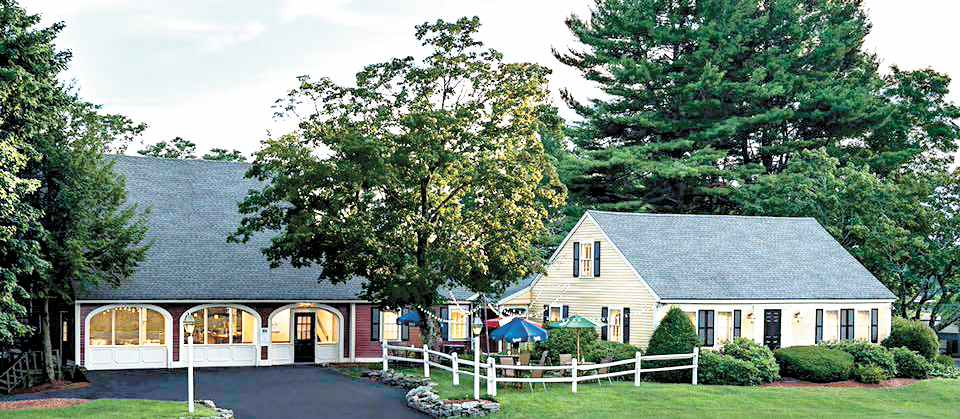Country Tavern, the historic, popular eatery beloved by many, headed for indefinite closure

An illustration that appears on the Country Tavern's Facebook page thanks patrons for their business
My first thought upon reading, with sadness and a couple cuss words directed at the COVID-19 pandemic, that owner Jon Randall is closing indefinitely Nashua’s landmark Country Tavern eatery, was something like, “I wonder if the lady of the house is OK with this?”
Surely the lady of the house should be involved in such decisions, even if nobody has seen her in close to 250 years. Notice I wrote “seen” – that’s because there are plenty of people who are more than certain they have heard, felt, or sensed the presence of this young lady at least once while visiting the Tavern during the decades it has graced the southwest corner of Amherst Street and Townsend West.
More about the lady of the house shortly, but first the unfortunate news that Randall posted on Facebook this week.
It’s both unfortunate and sad, most assuredly, but also quite understandable, given the stranglehold with which the pandemic has gripped all corners of the globe for more than two months now, accumulating not only human casualties but crippling small and medium size businesses along the way.
When Randall, now 60, took over the Tavern in 1995, he knew little to nothing about “Elizabeth,” the presence I referred to as the lady of the house, he told me.
“When I bought the place, I thought it was just something that someone made up for fun,” he said. Randall never considered using Elizabeth’s alleged presence as a marketing ploy; it wasn’t necessary, and he didn’t see it as a good fit.
Instead, he said, “it was the customers more than anything else” that perpetuated the alleged presence, which is alternately referred to as a myth, a legend, a fable or a slice of local folklore, depending upon whom one is talking to.
Restaurants like the Tavern are particularly hard hit by the pandemic, Randall said. “We sold atmosphere, we sold an experience … our business model was built almost entirely on (customers’) ability to gather in large groups,” he said.
While fast-food places with drive-throughs and restaurants that do a robust take-out business are getting by, that wouldn’t have worked at the Tavern, Randall said.
“It didn’t make sense for us to even go to takeout,” he said. “It would have ended up costing us more than what we would make.”
If there’s a good time to take a break from the demanding nature of the restaurant business, it’s during a pandemic, Randall said, half-jokingly.
“I’m 60 years old, been doing this for all these years … it’s been a fun run – even if after taking a break I decided to do something again,” he said, referring to whether he may one day consider reopening a restaurant.
“To be honest, I haven’t thought about it,” he said.
As for the Elizabeth legend (or myth, or …) one thing everyone can agree upon is that the building that houses the Tavern is steeped in Nashua history.
While the date of its appearance on a Colonial-era landscape dominated by wildnerness and cow-paths is reported as 1741 in many of the media stories and books, the city property records list it as built “about 1789.”
Regardless of exactly when it happened, those who subscribe to the theory that 22-year-old Elizabeth Ford has paid many an unseen – and very rarely, seen – visit to the Tavern also agree on why: It seems Elizabeth’s husband, a sea captain a number of years her senior, returned one day from nearly a year at sea and discovered Elizabeth, who was said to be quite a looker, had given birth.
Realizing, after doing the arithmetic, that the baby was someone else’s, Ford reportedly flew into a rage, locked a hysterical Elizabeth in a closet, did away with the baby, and buried the body “somewhere on the property.”
As the story goes, when Ford let Elizabeth out of the closet and told her what he’d done, she “went mad with grief,” according to one report, and attacked him. But the physically superior Ford grabbed a knife, stabbed Elizabeth to death, and tossed her body down a well.
Without Lassie around to go for help, poor Elizabeth was doomed.
Variations of the tale include a most grisly scenario in which Ford came home to find Elizabeth pregnant, waited for her to give birth, then killed her and the baby and buried them near, or in, a well.
Believers, who include teams of “ghost hunters” who visited the Tavern after hours to see if they could summon Elizabeth from the great beyond – or coax her spirit from the well – describe her as “a woman in white” who “continues to visit the restaurant and walk the grounds, seemingly in search of her dead daughter.”
Elizabeth is not to be feared, those who claim to be in the know assure folks. She’s quite mischievous, they say, sometimes “pushing glasses off the bar” or “moving” things around for laughs.
Some say Elizabeth’s “most common” antics involve “playing with women’s hair in the restroom,” and “playing with children who visit the restaurant.”
Randall, meanwhile, praises in his announcement his “dedicated and unbelievable staff” as always having been “the very core of the business. They are like family to me.
“The genuine unselfish attitude … they brought to work each day was unmatched, anywhere,” he wrote, adding that the attitude “truly defined the Country Tavern and I’m grateful to each of them for that.”
—
Dean Shalhoup’s column appears weekly in The Sunday Telegraph. He may be reached at 594-1256 or dshalhoup@nashuatelegraph.com.



